What Is Fintech SEO?
Fintech SEO is the specialized process of optimizing financial technology websites to enhance their search engine visibility, attract highly relevant users, and establish digital authority. Unlike general SEO strategies, fintech SEO requires a tailored approach that accounts for industry-specific regulations, user trust factors, and the rapidly evolving nature of financial technology.
As the fintech industry continues to expand, covering areas such as digital banking, blockchain solutions, AI-powered financial tools, and payment processing platforms, maintaining a strong online presence is essential. With increased reliance on digital financial services, fintech companies must ensure that their websites rank for relevant searches, driving targeted organic traffic that converts into customers. A well-structured SEO fintech strategy enables these companies to outperform competitors, build trust with potential clients, and navigate the complexities of the digital market effectively.
Why SEO Is Crucial for Fintech Companies?
SEO for fintech plays a fundamental role in driving growth, reducing customer acquisition costs, and ensuring long-term success. With billions of online searches happening every day for financial products and services, fintech companies need to optimize their SEO strategies to ensure they appear in front of their target audience. A well-optimized website increases visibility, attracts qualified leads, and enhances brand credibility.
Beyond visibility, SEO fintech services provide a cost-effective alternative to paid advertising. Unlike pay-per-click campaigns, which require continuous investment, SEO efforts generate sustainable organic traffic that compounds over time. This long-term approach reduces dependency on paid marketing channels and ensures a steady flow of high-intent visitors.
Trust and credibility are critical in the financial sector, where users demand secure, transparent, and reliable services. Search engines prioritize authoritative websites with strong E-E-A-T (Experience, Expertise, Authoritativeness, and Trustworthiness), making SEO an essential tool for fintech companies to establish themselves as trustworthy industry leaders.
Another key reason why fintech SEO is indispensable is the regulatory environment. Financial technology firms must adhere to strict regulations and compliance standards, ensuring transparency in their digital presence. Effective SEO strategies help fintech brands communicate trust signals while optimizing content to meet industry regulations.
Fintech SEO also provides a competitive advantage against both traditional financial institutions and emerging digital competitors. As more consumers shift toward fintech solutions, companies that optimize their digital footprint can capitalize on this shift, positioning themselves as the preferred choice for modern financial services.
How Fintech SEO Differs from Traditional SEO?
SEO for fintech differs from traditional SEO due to its specialized nature, regulatory requirements, and emphasis on trust and security. While general SEO focuses on optimizing websites for search engines, fintech SEO demands a more strategic and compliance-driven approach.
One major difference lies in keyword strategy. Traditional SEO targets broad, high-volume keywords, whereas fintech SEO requires a focus on niche-specific, high-intent keywords that align with financial services and user needs. The competition for these keywords is intense, requiring in-depth research and strategic content planning.
Regulatory compliance is another critical distinction. Unlike standard SEO, which primarily focuses on content quality and backlinks, fintech SEO must ensure adherence to legal frameworks such as GDPR, PCI DSS, and financial advertising regulations. This means that every piece of content, landing page, and financial statement must be meticulously crafted to meet compliance standards while remaining SEO-friendly.
Trust factors play a much larger role in fintech SEO compared to traditional industries. Fintech companies must prioritize security signals, transparent financial information, and authoritative content to build credibility with both users and search engines. Factors like SSL certification, customer reviews, expert-authored content, and clear disclaimers significantly impact SEO performance in the fintech sector.
Content strategy in fintech SEO is also highly specialized. While traditional SEO often focuses on broad, informative content, fintech SEO requires deep, data-driven content that educates users on complex financial topics. Case studies, regulatory insights, whitepapers, and expert-driven blog posts are essential for building authority in the financial space.
The competitive environment in fintech SEO is significantly more challenging than in many other industries. With both established banks and innovative startups competing for search rankings, fintech companies must deploy advanced SEO fintech strategies, such as AI-driven keyword analysis, structured data implementation, and mobile-first optimization.
The differences between traditional SEO and fintech SEO highlight the need for a more nuanced, industry-specific approach. By understanding these distinctions, fintech companies can develop a more effective SEO fintech marketing strategy that aligns with their unique challenges and growth objectives.
Fintech SEO Vs Traditional SEO
| Aspect | Fintech SEO | Traditional SEO |
| Target Audience | Financial professionals, investors, tech-savvy users | General consumers, business professionals, broad audience |
| Regulatory Compliance | High compliance requirements (financial regulations, legal constraints) | Less stringent regulations (depends on industry) |
| Keyword Strategy | Long-tail, high-authority, financial-related keywords | Broad, high-volume keywords |
| Content Type | Educational content, financial insights, compliance-driven information | Diverse content, including blogs, e-commerce pages, general info |
| Trust Signals | E-A-T (Expertise, Authoritativeness, Trustworthiness) is crucial | E-A-T is important but varies by industry |
| Link Building | Requires high-quality links from financial and fintech domains | Diverse link-building strategies across industries |
| User Experience | Smooth UX with secure and user-friendly navigation. | Optimized UX, but security is less critical than in fintech |
| Conversion Optimization | Focus on lead generation, account sign-ups, secure transactions | Conversions depend on industry (sales, sign-ups, traffic) |
| Technical SEO Focus | Strong emphasis on security, schema markup for financial data | Standard technical SEO practices |
| Competitive Environment | Highly competitive with strict advertising policies | Competitive but fewer regulatory restrictions |
AI-SEO vs Traditional SEO: How Artificial Intelligence is Transforming Search Optimization
SEO is constantly evolving, and artificial intelligence (AI) is reshaping how fintech companies optimize their websites for search engines. While traditional SEO relies on manual keyword research, content creation, and link-building, AI-SEO introduces automation, data-driven decision-making, and predictive analytics to enhance performance.
One of the biggest differences between AI-SEO and traditional SEO is keyword research. In traditional SEO, specialists manually analyze keyword trends, search volume, and competition. AI-SEO, on the other hand, uses machine learning algorithms to analyze vast amounts of search data, predict future keyword trends, and automatically suggest high-intent long-tail keywords that are more likely to convert.
Another major shift is in content creation. Traditional SEO relies on human-written content optimized for keywords and user engagement. AI-SEO utilizes NLP (Natural Language Processing) and generative AI tools like GPT-based models to assist in content writing, ensuring optimized, structured, and high-quality content that aligns with user intent. AI-powered tools can also analyze search patterns to suggest content topics that are likely to rank well.
Search intent analysis has also advanced with AI integration. In traditional SEO, understanding search intent is a manual process where SEO specialists interpret what users are looking for based on keyword analysis. AI-SEO automates this by using NLP algorithms to understand context, semantic relationships, and user behavior trends, allowing content to be better optimized for real user needs.
When it comes to on-page optimization, traditional SEO requires manual adjustments of meta tags, headers, keyword placement, and content formatting. AI-SEO automates much of this process by using AI-driven tools to optimize meta descriptions, analyze content structure, and improve readability based on search engine preferences.
Link building is another area where AI is making an impact. Traditional link-building relies on manual outreach, guest posting, and directory submissions, which can be time-consuming. AI-SEO tools analyze backlink opportunities, identify high-authority websites, automate personalized outreach, and help acquire high-quality backlinks more efficiently.
AI-SEO also improves technical SEO by identifying crawl errors, broken links, and Core Web Vitals issues much faster than manual audits. AI-driven analytics platforms can detect patterns in user behavior and provide actionable insights on how to improve site structure, loading speed, and mobile optimization.
Ultimately, the biggest advantage of AI-SEO is its ability to process large amounts of data instantly, make real-time adjustments, and provide highly personalized experiences. While traditional SEO still plays a crucial role in strategy and creative content development, AI-SEO is rapidly becoming essential for fintech companies that want to scale their SEO efforts, increase efficiency, and stay ahead of search algorithm updates.
The future of fintech SEO will likely involve a hybrid approach, where AI-powered automation enhances traditional SEO techniques, leading to more data-driven, adaptive, and effective strategies that ensure higher rankings, better user engagement, and increased conversions.
Unique Challenges of Fintech SEO
High Competition in the Financial Market
Fintech SEO is one of the most competitive digital marketing fields. Large financial institutions dominate search rankings, making it difficult for fintech startups to gain visibility. A fintech SEO agency must implement advanced strategies to compete with banks, investment firms, and insurance providers.
The fintech industry is rapidly expanding, with new companies emerging daily. Traditional financial institutions invest heavily in digital marketing, while fintech firms push innovative SEO fintech services. This ongoing battle for search rankings makes SEO fintech strategies essential for long-term success.
Paid advertising in finance is expensive, forcing fintech brands to focus on organic search traffic. While PPC campaigns generate immediate results, fintech digital marketing agency experts prioritize SEO for fintech to ensure consistent lead generation. Achieving high rankings requires continuous optimization, strong backlinks, and data-driven content strategies.
Regulatory Compliance and Legal Restrictions
SEO for fintech is more complex than standard digital marketing due to strict financial regulations. Legal requirements dictate how fintech companies present information, affecting keyword usage, content strategies, and website optimization. Regulatory bodies enforce guidelines that impact fintech SEO strategies, making compliance a top priority.
Google prioritizes transparency in financial content, requiring fintech brands to follow strict advertising and disclosure policies. SEO fintech marketing agency specialists must ensure all claims are backed by verifiable data. Misleading or exaggerated financial promises can lead to penalties, damaging rankings and trust.
Privacy regulations like GDPR and CCPA further complicate fintech SEO. Fintech companies must handle customer data securely while maintaining compliance with global data protection laws. A fintech SEO agency helps businesses align with legal requirements while optimizing for search visibility. Secure website architecture, clear privacy policies, and trust-building content play a crucial role in rankings.
User Trust and E-E-A-T (Experience, Expertise, Authoritativeness, Trustworthiness)
Trust is a fundamental pillar of SEO fintech strategies. Search engines prioritize websites that demonstrate financial expertise and credibility. Google’s E-E-A-T framework rewards fintech brands that provide well-researched, authoritative content from industry professionals.
Establishing trust requires expert-driven content, transparent financial disclosures, and security measures. A fintech digital marketing agency ensures that content aligns with Google’s quality standards. Articles authored by certified financial experts increase credibility, leading to higher engagement and improved rankings.
Transparency is key in fintech SEO. Websites must display security certifications, regulatory compliance badges, and verified customer testimonials. SEO fintech services also include optimizing technical security measures, such as SSL encryption and secure payment gateways. By prioritizing trust, fintech brands strengthen their online reputation and search visibility.
E-E-A-T Framework In Fintech SEO
| E-E-A-T Factor | Description | How to Improve |
| Experience | Demonstrating firsthand knowledge and real-world experience in financial topics. | Publish case studies, personal insights, and real-world examples. Use testimonials and user-generated content. |
| Expertise | Showcasing industry credentials, certifications, and professional expertise. | Highlight author bios, industry certifications, and professional expertise. Create in-depth, data-driven content. |
| Authoritativeness | Building recognition through reputable mentions, guest posts, and authoritative backlinks. | Earn backlinks from trusted financial sources, contribute to authoritative platforms, and collaborate with experts. |
| Trustworthiness | Ensuring transparency, security, compliance, and clear financial disclosures. | Maintain secure HTTPS, comply with financial regulations, provide clear disclaimers, and display user trust signals. |
Keyword Research and Market Analysis for Fintech SEO
Keyword research is the foundation of successful SEO for fintech. Identifying the right keywords ensures that fintech companies attract high-intent users searching for relevant financial solutions. A fintech SEO agency focuses on targeting keywords that drive organic traffic, improve conversion rates, and enhance brand visibility.
Market analysis plays a crucial role in SEO fintech services. Understanding industry trends, customer behavior, and market competition helps fintech brands optimize their content strategy. Fintech digital marketing agency experts use data-driven approaches to select the most effective keywords for long-term growth.
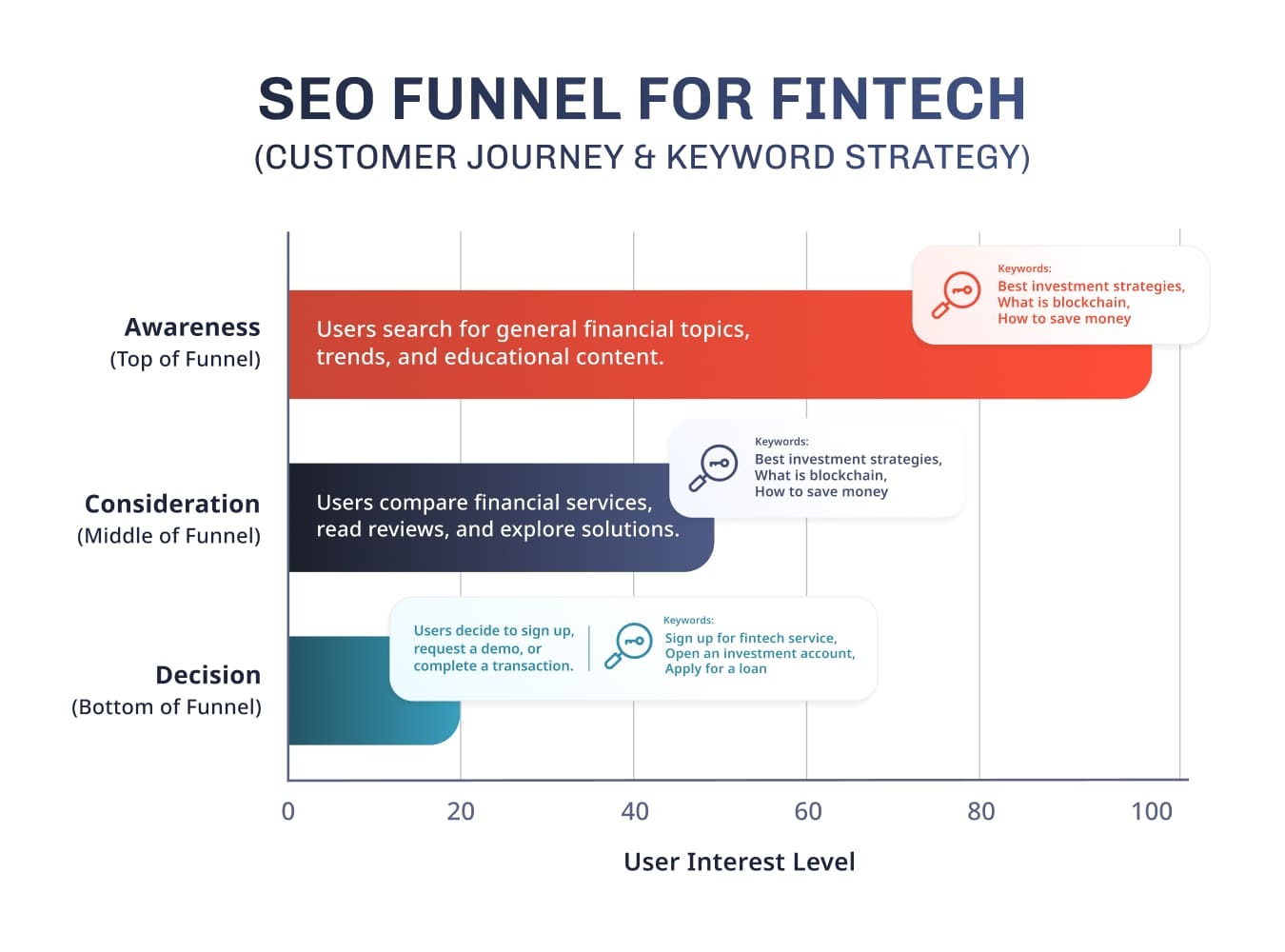
Understanding Search Intent in the Fintech Industry
Search intent defines what users expect to find when they enter a query. In fintech SEO, aligning content with user intent is essential for higher rankings and engagement. Search engines prioritize pages that provide relevant, valuable information based on user expectations.
There are three primary types of search intent in the fintech industry. Informational intent includes searches like “how does blockchain payment work?” or “fintech SEO strategies.” Users seek knowledge rather than services. Navigational intent involves queries such as “best fintech digital marketing agency” or “top fintech SEO agency,” where users look for specific brands or solutions. Transactional intent includes searches like “best SEO fintech services” or “hire fintech SEO experts,” where users are ready to take action.
Fintech companies must structure their content based on these intent categories. Blog articles target informational queries, while service pages optimize for transactional keywords. A strong fintech SEO strategy ensures content matches the intent behind each keyword, increasing conversion potential.
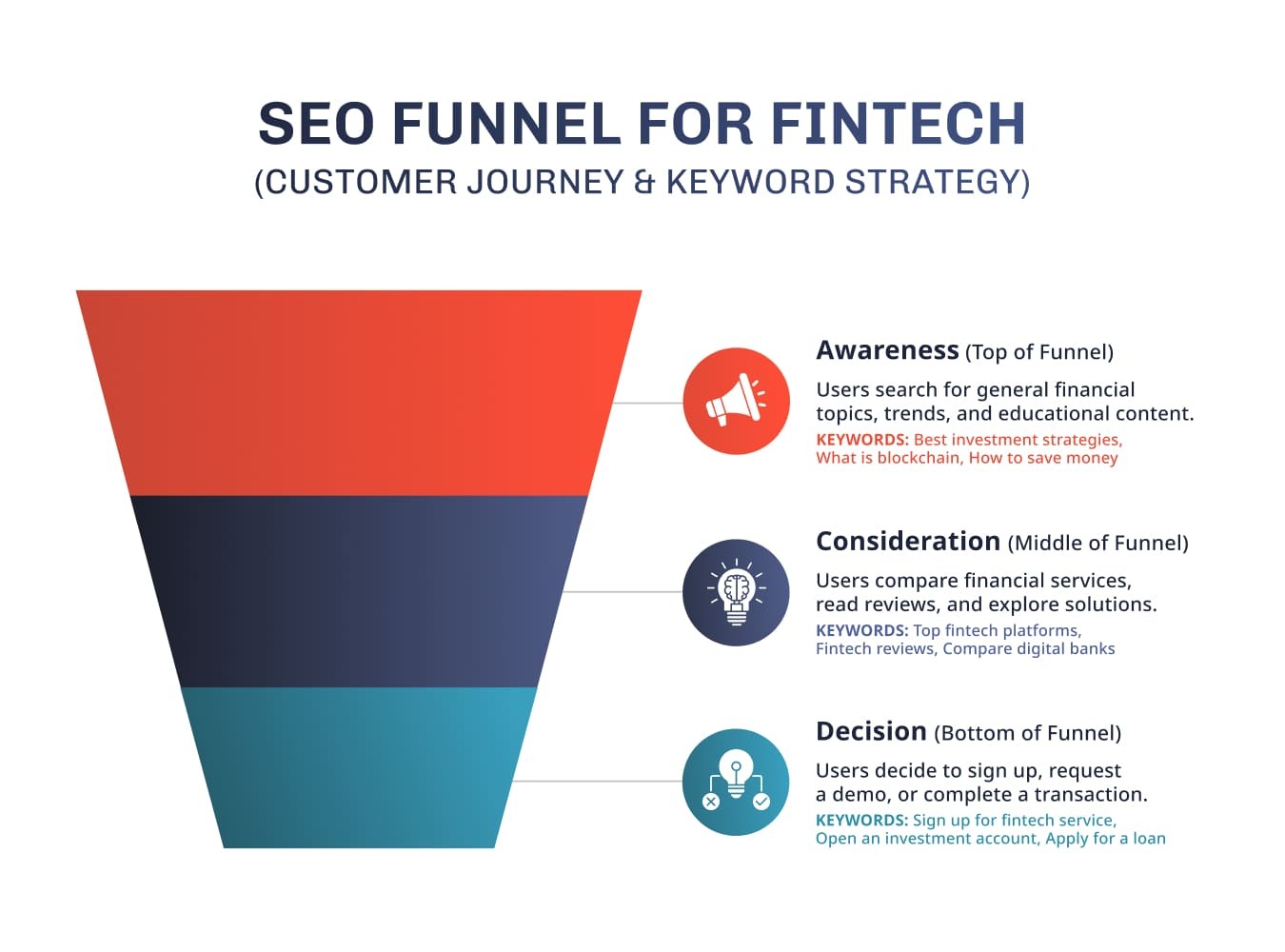
Finding High-Intent and Long-Tail Keywords
High-intent keywords drive targeted traffic to fintech websites. These are search queries from users who are actively looking for fintech solutions. Unlike broad terms such as “SEO,” keywords like “SEO fintech marketing agency for startups” attract users with clear intent.
Long-tail keywords are specific search terms with lower competition but higher conversion rates. For example, “best fintech SEO strategies for SaaS platforms” targets a niche audience. SEO fintech services prioritize long-tail keywords to reach users searching for precise fintech solutions.
A fintech digital marketing agency conducts in-depth keyword analysis to identify profitable terms. By combining search volume data, competition analysis, and user intent research, fintech brands can optimize their SEO strategies. Using a mix of high-volume and long-tail keywords improves ranking potential while capturing a diverse audience.
Competitor Keyword Analysis
Analyzing competitor keywords provides valuable insights for fintech SEO. Understanding which keywords drive traffic to competing websites helps fintech brands refine their strategies. A fintech SEO agency uses advanced tools to track competitor rankings, identify gaps, and discover new opportunities.
Competitor keyword analysis involves examining search rankings, backlink profiles, and content strategies of top-performing fintech brands. If a competitor ranks for “best fintech SEO agency,” optimizing content around variations of that keyword can improve visibility. Identifying weaknesses in competitor strategies allows fintech companies to gain a competitive edge.
SEO fintech marketing agency specialists also track emerging trends in financial technology. As new fintech products and services enter the market, keyword opportunities evolve. Continuous monitoring ensures fintech brands stay ahead of competitors and adapt to changing search behaviors.
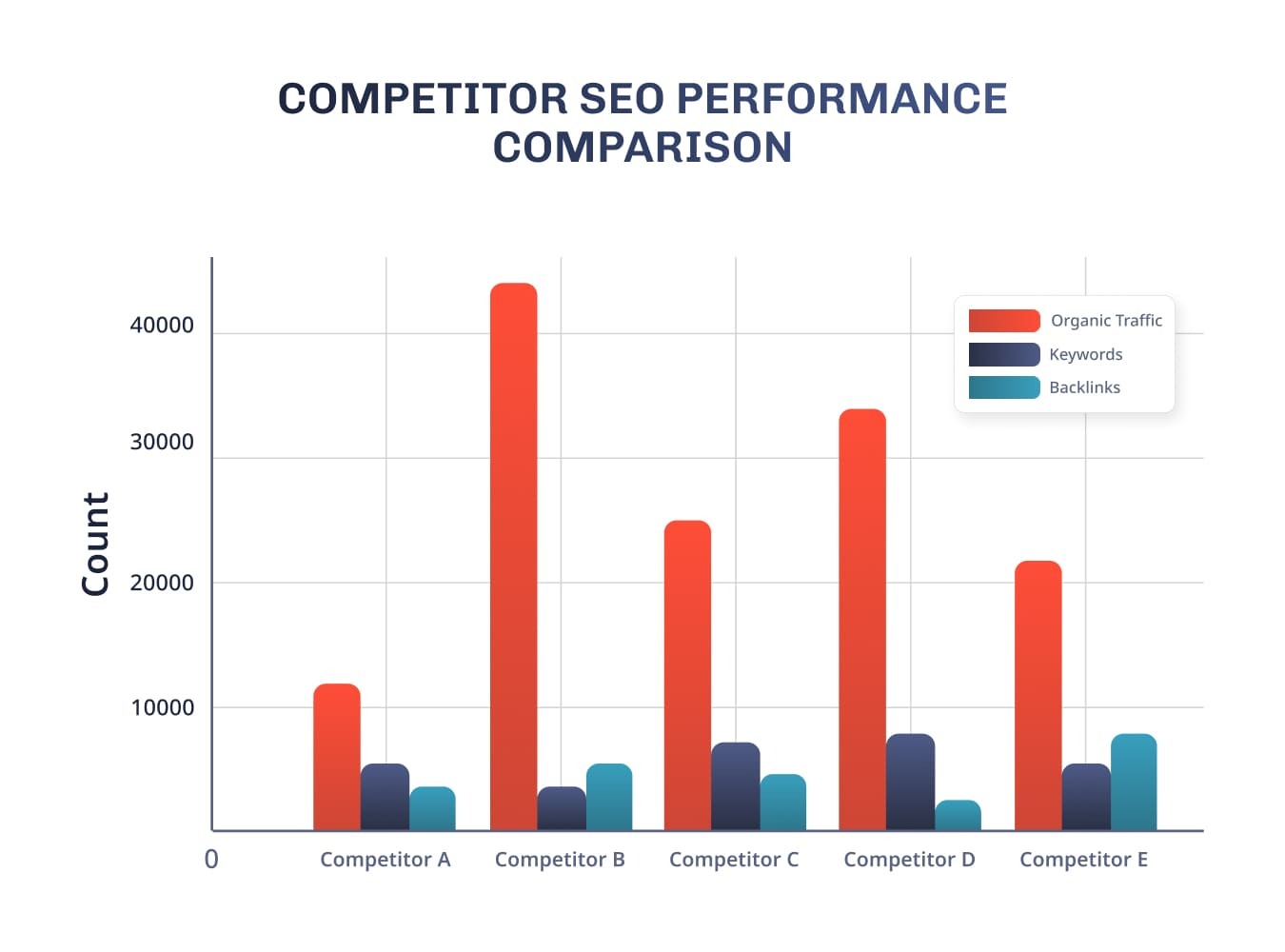
Using AI and Data Analytics for Fintech Keyword Strategy
Artificial intelligence and data analytics have revolutionized keyword research for fintech SEO. AI-powered tools analyze massive datasets, predicting search trends and user behavior patterns. Fintech SEO strategies use AI to refine keyword targeting and enhance content optimization.
Machine learning models identify keyword variations, search intent shifts, and emerging trends in fintech searches. AI-driven insights help fintech digital marketing agency experts optimize content dynamically. Predictive analytics enable fintech brands to stay ahead of competitors by adapting their SEO strategies proactively.
Data-driven keyword strategy enhances precision in fintech SEO. By integrating AI with traditional keyword research methods, fintech brands can target the most effective search queries. SEO fintech services use automation to track keyword performance, refine content strategies, and maximize organic growth.
On-Page SEO Strategies for Fintech Websites
On-page SEO is essential for fintech companies looking to improve search engine rankings and user engagement. Unlike general SEO, fintech SEO requires a specialized approach that balances compliance, user trust, and content depth. A fintech SEO agency focuses on optimizing every on-page element, from metadata to content structure, ensuring search engines and users find the website valuable.
Fintech brands must strategically place keywords such as SEO fintech, fintech SEO agency, and fintech digital marketing agency throughout their pages. High-quality content, fast loading speeds, and structured data help enhance visibility. On-page optimization ensures fintech websites rank higher while maintaining credibility and regulatory compliance.
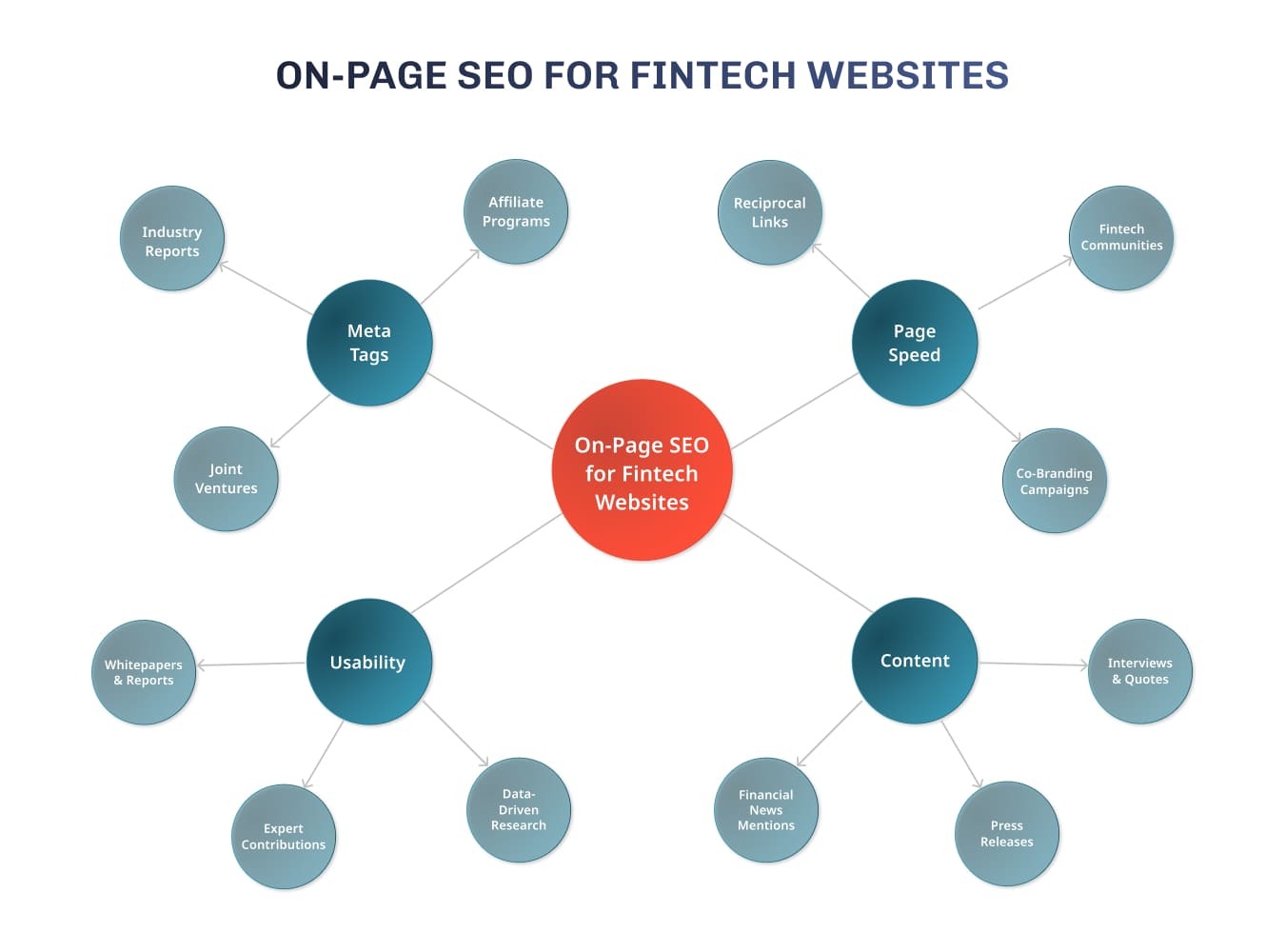
Optimizing Fintech Landing Pages
Landing pages are critical for lead generation in fintech SEO strategies. These pages must communicate trust, compliance, and value while targeting high-intent keywords. SEO for fintech requires optimizing landing pages to include clear financial offerings, secure payment options, and compelling calls to action.
A fintech SEO agency focuses on structuring landing pages for maximum conversions. Headlines should incorporate SEO fintech services while maintaining clarity and relevance. Content should emphasize benefits, use case scenarios, and industry-specific credibility signals such as certifications and testimonials.
Page speed plays a crucial role in landing page optimization. Slow-loading pages increase bounce rates, negatively impacting rankings. Fintech digital marketing agency experts implement performance enhancements such as image compression, caching, and server optimizations to improve load times.
Content Strategy: Blog Posts, Case Studies, and Whitepapers
Content is the backbone of SEO fintech strategies. High-value content attracts organic traffic, builds authority, and educates potential customers. A fintech digital marketing agency develops content strategies that include blog posts, case studies, and whitepapers tailored to financial audiences.
Blog posts should focus on industry trends, financial insights, and fintech SEO strategies. Long-form content covering topics like SEO fintech marketing agency best practices improves engagement and dwell time. In-depth financial guides enhance credibility, positioning fintech brands as thought leaders.
Case studies showcase success stories, demonstrating how fintech solutions solve real-world problems. These pages help convert prospects by providing tangible proof of effectiveness. Whitepapers add further depth, offering data-driven insights that appeal to industry professionals and investors.
SEO fintech services ensure content is optimized with proper heading structures, keyword placement, and internal linking. Well-structured content enhances search visibility while providing users with valuable, actionable information.
Schema Markup and Structured Data for Financial Services
Schema markup enhances how search engines understand and display fintech content. Proper implementation of structured data improves search visibility by enabling rich results, such as FAQs, reviews, and financial details. A fintech SEO agency ensures schema markup aligns with Google’s best practices.
Financial organizations benefit from specific structured data types such as “FinancialService,” “Organization,” and “FAQPage.” These elements help search engines present relevant information directly in search results. Rich snippets increase click-through rates, boosting organic traffic.
SEO fintech services also implement breadcrumb schema for better navigation, improving user experience. Adding structured data to financial calculators, pricing tables, and loan comparison pages enhances engagement. Optimized schema markup strengthens fintech SEO strategies, making content more discoverable and authoritative.
Improving User Experience (UX) and Mobile Optimization
User experience is a crucial factor in SEO fintech strategies. Search engines prioritize fintech websites that provide smooth navigation, intuitive design, and fast loading speeds. Fintech digital marketing agency experts focus on optimizing UX to improve engagement and retention.
Mobile optimization is essential for fintech brands, as a large portion of users access financial services via mobile devices. Responsive design, mobile-friendly interfaces, and streamlined payment processes improve usability. Google’s mobile-first indexing reinforces the importance of optimizing fintech sites for smartphones.
SEO for fintech also involves enhancing accessibility. Clear typography, contrast adjustments, and user-friendly layouts ensure an inclusive experience. A fintech SEO agency prioritizes usability improvements to reduce bounce rates and increase conversions.
By implementing strong on-page SEO practices, fintech companies enhance visibility, user trust, and organic traffic. On-page optimization remains a foundational element of fintech SEO strategies, ensuring long-term digital growth.
Technical SEO for Fintech Platforms
Technical SEO is the backbone of any fintech SEO strategy. Unlike content optimization, technical SEO focuses on improving website infrastructure to ensure search engines can efficiently crawl, index, and rank fintech websites. A fintech SEO agency ensures websites load quickly, remain secure, and comply with regulatory standards.
Fintech digital marketing agency experts optimize site architecture, implement structured data, and enhance performance for better rankings. With financial services relying on security and user trust, technical SEO fintech strategies include encryption, secure hosting, and compliance with data privacy laws. These factors not only improve SEO for fintech but also enhance user experience.
Site Speed Optimization and Core Web Vitals
Site speed plays a critical role in fintech SEO. Google’s Core Web Vitals measure page loading performance, interactivity, and visual stability. A slow website results in higher bounce rates, lower engagement, and reduced rankings. SEO fintech services prioritize performance enhancements to meet Google’s speed benchmarks.
A fintech SEO agency optimizes site speed by implementing caching, reducing image sizes, and using content delivery networks (CDNs). Minimizing JavaScript, enabling browser caching, and optimizing server response times improve loading speeds. Fast-loading pages enhance user experience, increasing conversion rates for fintech services.
Core Web Vitals include three key metrics: Largest Contentful Paint (LCP), First Input Delay (FID), and Cumulative Layout Shift (CLS). Fintech digital marketing agency specialists ensure these metrics are optimized by using efficient coding practices and modern development frameworks. A fast and responsive website strengthens fintech SEO strategies.
Secure Website Structure: HTTPS, Data Privacy, and Compliance
Security is essential in SEO for fintech. Financial websites handle sensitive user data, making HTTPS encryption mandatory. Google prioritizes secure websites in search rankings, making SSL certificates a fundamental requirement for fintech SEO strategies.
A fintech SEO agency ensures data privacy by complying with regulations such as GDPR, CCPA, and PCI DSS. Secure login processes, encrypted payment gateways, and multi-factor authentication enhance user trust. SEO fintech services include privacy policy pages, cookie consent banners, and clear terms of service to improve transparency.
Technical SEO fintech strategies also involve securing APIs and fintech web applications against cyber threats. Secure coding practices prevent data breaches, protecting user information and maintaining search engine trust. Search engines favor secure platforms, improving ranking potential in fintech search queries.
Optimizing Fintech Web Apps and Progressive Web Apps (PWAs)
Modern fintech companies rely on web apps and PWAs to deliver fluid and efficient digital experiences. These platforms provide app-like functionality directly in browsers, improving accessibility and performance. A fintech SEO agency ensures PWAs are optimized for search visibility, enabling financial services to reach a broader audience.
SEO fintech services include implementing service workers for offline functionality, optimizing app load speeds, and ensuring mobile responsiveness. Progressive Web Apps enhance user engagement by providing a smooth, app-like experience without requiring downloads. Fintech SEO strategies prioritize structured URLs, clean navigation, and proper indexing to improve discoverability.
Technical SEO fintech practices also involve mobile-first design. With increasing mobile traffic, fintech platforms must ensure smooth and consistent functionality across all devices. A fintech digital marketing agency focuses on responsive layouts, touch-friendly interfaces, and fast interactions to enhance mobile performance.
Crawling, Indexing, and Technical Audits for Fintech Websites
Search engine crawling and indexing determine how well a fintech website ranks. If search engines cannot access content efficiently, rankings suffer. A fintech SEO agency conducts regular technical audits to identify and fix indexing issues, ensuring full search engine visibility.
SEO fintech strategies include optimizing robots.txt files, using XML sitemaps, and implementing canonical tags to prevent duplicate content issues. Structured site architecture improves search engine crawlers’ ability to navigate fintech websites, enhancing overall rankings.
Technical audits identify broken links, slow-loading pages, and mobile usability issues. A fintech digital marketing agency analyzes Google Search Console data to detect indexing problems and resolve them quickly. By ensuring a fintech website is fully optimized for crawling and indexing, businesses improve their search engine performance and organic reach.
Strong technical SEO for fintech platforms ensures high rankings, fast performance, and enhanced security. By addressing these factors, fintech brands can maintain a competitive edge in search results while building trust with users and regulators.
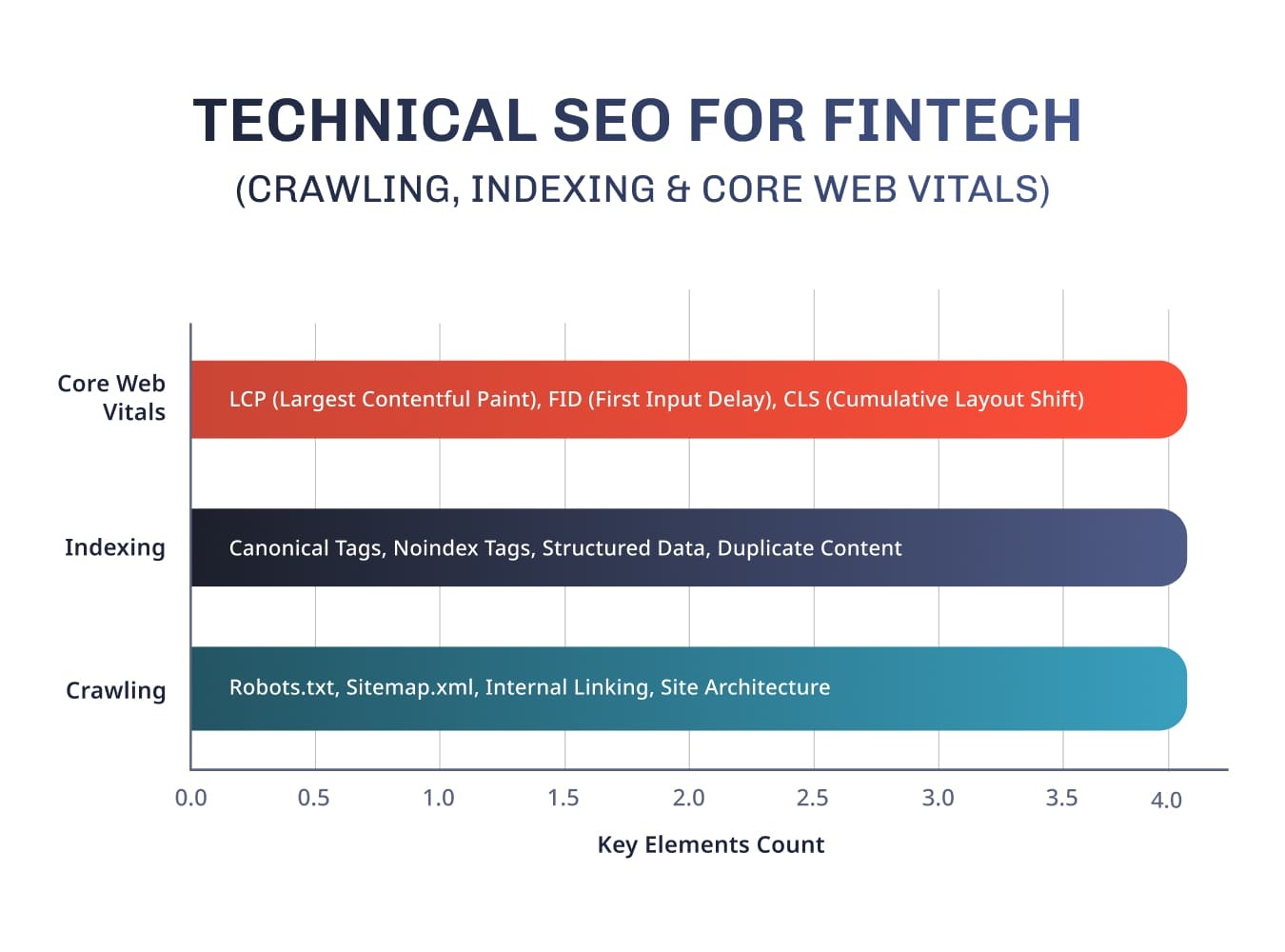
Off-Page SEO and Link Building Strategies
Off-page SEO is a critical component of fintech SEO strategies. Unlike on-page optimization, which focuses on website content and structure, off-page SEO enhances a fintech brand’s authority through external signals such as backlinks, brand mentions, and social engagement. Search engines assess these factors to determine credibility and ranking potential.
A fintech SEO agency implements high-quality link-building strategies to improve domain authority. Backlinks from reputable financial websites, news outlets, and fintech directories signal trustworthiness. SEO fintech services also involve PR outreach, industry collaborations, and digital networking to establish a strong online presence.
High-Authority Link Building for Fintech Brands
Link building is one of the most effective SEO fintech strategies for increasing rankings. High-authority backlinks improve a fintech website’s trust score, helping it outrank competitors. Search engines treat links from authoritative financial publications, government sites, and industry blogs as endorsements of credibility.
A fintech SEO agency focuses on earning links from trusted sources such as financial news sites, regulatory bodies, and banking institutions. Creating high-value content, such as research reports and expert guides, encourages organic backlinks. SEO for fintech also benefits from partnerships with established finance influencers and thought leaders.
Earning links naturally requires a long-term strategy. SEO fintech marketing agency specialists use ethical outreach methods, avoiding spammy link-building tactics that could lead to penalties. By focusing on relevance and authority, fintech brands can achieve sustainable growth through high-quality backlinks.
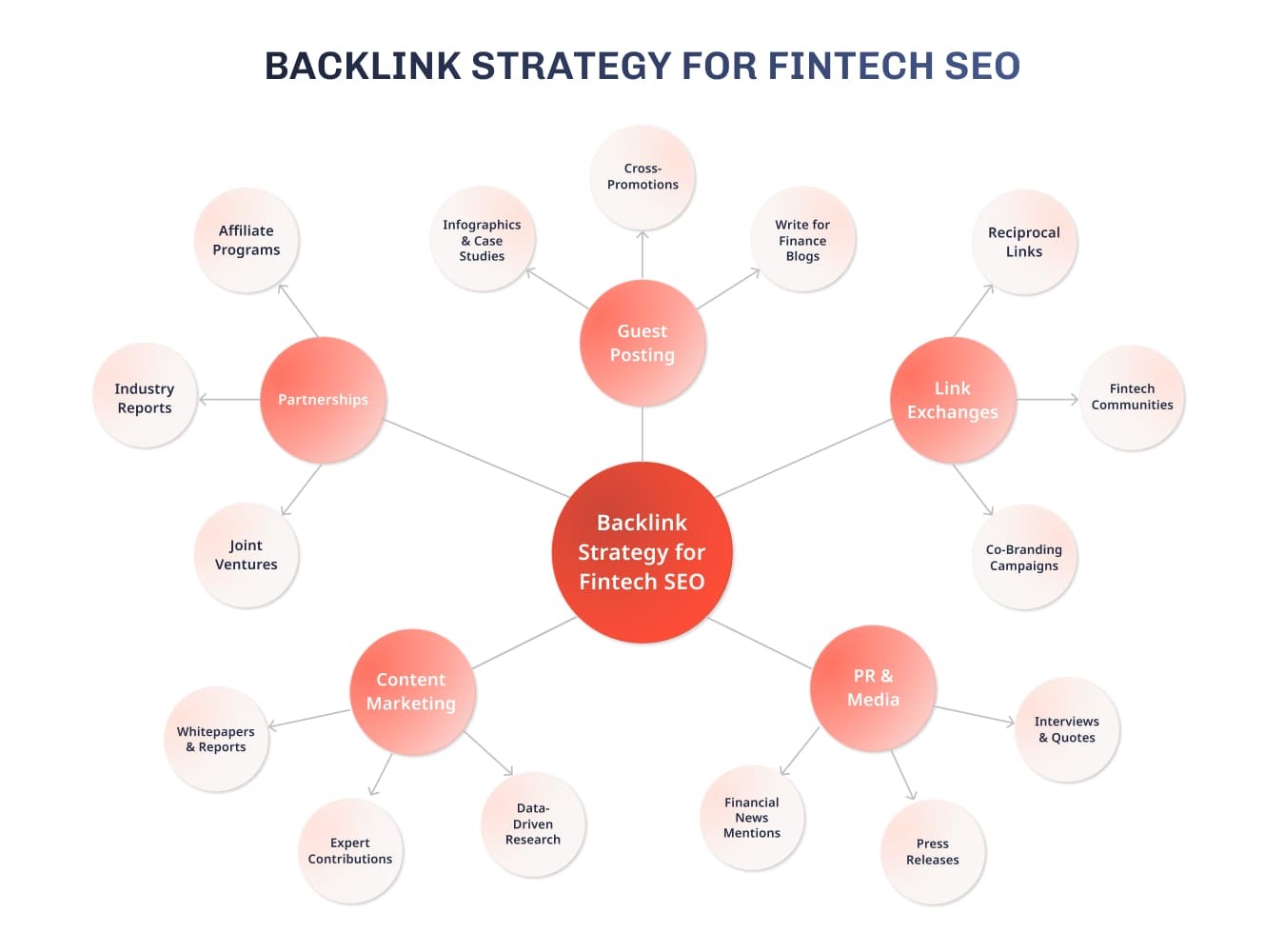
Guest Posting and PR Strategies in the Financial Sector
Guest posting is a powerful strategy for fintech SEO. Publishing articles on reputable financial websites helps fintech brands gain exposure while securing valuable backlinks. A fintech SEO agency identifies high-authority platforms that align with the brand’s expertise and target audience.
SEO fintech services include crafting high-quality guest posts with strategic keyword placement. These articles provide valuable insights on industry trends, regulatory changes, and fintech innovations. By contributing expert content to respected financial publications, fintech brands establish themselves as industry leaders.
Public relations (PR) strategies also play a key role in SEO for fintech. Press releases announcing funding rounds, product launches, or regulatory approvals attract media attention. SEO fintech marketing agency experts distribute these releases to financial news platforms, generating backlinks and brand mentions that enhance search rankings.
Building Partnerships and Industry Citations
Strong partnerships enhance fintech SEO strategies by creating opportunities for co-marketing, link exchanges, and industry recognition. Collaborating with financial service providers, regulatory bodies, and fintech associations strengthens domain authority. A fintech SEO agency facilitates these partnerships through targeted outreach and networking.
Industry citations also contribute to SEO fintech growth. Being listed in fintech directories, association websites, and financial review platforms improves search credibility. SEO fintech services ensure fintech companies are featured in business databases like Crunchbase, Finextra, and Financial Times listings.
Fintech digital marketing agency specialists also secure speaking engagements, podcast interviews, and expert panel participation. These activities generate organic backlinks while positioning fintech brands as authoritative voices in the financial industry.
Leveraging Social Media and Digital PR for SEO Growth
Social media plays a vital role in fintech SEO by driving brand awareness, engagement, and referral traffic. While social signals do not directly impact rankings, they increase content visibility and backlink opportunities. A fintech SEO agency optimizes content for platforms like LinkedIn, Twitter, and industry-specific forums.
SEO fintech strategies involve sharing insightful articles, engaging with fintech communities, and participating in trending discussions. Financial influencers and business leaders amplify fintech content, generating organic shares and inbound links. Fintech digital marketing agency specialists also use social media ads to increase content reach and brand exposure.
Digital PR complements social media efforts by securing features in major financial publications. SEO fintech services include pitching expert commentary, data-driven reports, and case studies to journalists. Earning mentions in Forbes, Bloomberg, and TechCrunch boosts brand authority while contributing to fintech SEO success.
By integrating off-page SEO tactics, fintech brands strengthen their search visibility and credibility. High-quality link building, PR outreach, and strategic partnerships create a strong digital foundation, ensuring long-term growth in competitive financial markets.
Local SEO for Fintech Businesses
Local SEO is a crucial part of fintech SEO strategies, helping companies attract customers in specific regions. While many fintech businesses operate digitally, local SEO fintech services enhance visibility for financial firms with physical offices, regional services, or location-based offerings.
A fintech SEO agency optimizes local search presence by improving business listings, managing customer reviews, and using geo-targeted keywords. Search engines prioritize fintech brands that provide accurate location data, ensuring they appear in relevant local searches. Local fintech SEO strategies increase foot traffic, drive regional leads, and improve trust among nearby users.
Optimizing Google Business Profile for Financial Services
Google Business Profile (GBP) is essential for fintech digital marketing agency strategies. A well-optimized GBP listing improves local search rankings, driving organic traffic from location-based queries. SEO fintech services focus on enhancing GBP profiles with accurate business details, high-quality images, and keyword-rich descriptions.
A fintech SEO agency ensures GBP listings include verified contact information, business hours, and service categories. Adding fintech SEO strategies-related keywords in the business description helps improve search rankings. Companies offering localized financial services, such as lending or investment consulting, benefit from appearing in Google’s “Local Pack” results.
Customer interactions on GBP also impact rankings. SEO fintech marketing agency specialists encourage businesses to respond to customer inquiries, update service information regularly, and post fintech-related updates. Engaging with local audiences through Google posts increases visibility and credibility in the fintech sector.
Local Citations and Reviews Management
Local citations play a key role in fintech SEO, helping businesses establish authority within regional markets. A fintech SEO agency ensures fintech brands are listed on reputable financial directories, business listings, and regional databases. Consistent NAP (Name, Address, Phone Number) information across all platforms strengthens SEO fintech services.
Reviews are a major ranking factor in local SEO. Positive customer feedback builds trust, improves search rankings, and attracts new clients. SEO for fintech includes managing customer reviews on Google, Trustpilot, and financial service directories. A fintech digital marketing agency develops review acquisition strategies, encouraging satisfied clients to share their experiences.
Negative reviews can impact reputation and search rankings. SEO fintech marketing agency experts monitor and respond to feedback professionally, resolving customer concerns. Engaging with reviews demonstrates credibility, showing potential clients that fintech brands prioritize customer satisfaction.
Targeting Localized Keywords and Geo-Specific Content
Localized keywords drive targeted traffic for fintech businesses operating in specific regions. SEO fintech services focus on incorporating geo-specific terms such as “fintech SEO agency in New York” or “best fintech SEO strategies in London.” These targeted phrases help fintech brands rank for location-based searches.
A fintech SEO agency conducts keyword research to identify high-intent regional queries. Optimizing website content with local keywords, service pages, and location-based landing pages enhances search visibility. Blog posts covering regional fintech trends or regulatory changes also improve local SEO fintech strategies.
Geo-specific content strengthens local rankings. Publishing case studies about successful fintech implementations in specific areas helps attract local clients. Fintech digital marketing agency experts ensure location-based content remains relevant, engaging, and optimized for search engines.
Fintech SEO for Mobile and Voice Search
Mobile optimization is essential for local SEO fintech strategies. A fintech SEO agency ensures websites are mobile-friendly, fast-loading, and easy to navigate. Google prioritizes mobile-first indexing, making responsive design a key factor in fintech SEO.
Voice search is transforming local SEO for fintech businesses. Users increasingly rely on voice assistants to search for financial services using conversational queries like “best fintech SEO agency near me.” SEO fintech marketing agency specialists optimize content for natural language processing, ensuring fintech brands rank for voice searches.
Mobile and voice search strategies include optimizing FAQ pages, using structured data, and incorporating question-based keywords. A fintech digital marketing agency focuses on featured snippets and local search optimizations to capture voice-driven traffic. By improving mobile performance and voice search compatibility, fintech brands enhance their local SEO presence.
Local SEO is a powerful tool for fintech businesses seeking regional visibility. Optimizing Google Business Profiles, managing reviews, and targeting local keywords help fintech companies establish strong community engagement. By focusing on mobile and voice search, fintech SEO strategies ensure brands remain competitive in the ever-changing search environment.
Content Marketing and Thought Leadership in Fintech SEO
Content marketing is a core element of fintech SEO strategies. Unlike traditional marketing, fintech content must establish authority, educate users, and build trust. A fintech SEO agency crafts high-value content that improves search rankings, enhances brand credibility, and drives organic traffic.
Thought leadership plays a crucial role in SEO fintech services. By producing expert-driven content, fintech brands position themselves as industry leaders. Publishing insightful reports, case studies, and research-backed articles strengthens E-E-A-T (Experience, Expertise, Authoritativeness, Trustworthiness), a key factor in fintech SEO.
Fintech digital marketing agency specialists ensure content aligns with both user intent and search engine algorithms. High-quality content answers complex financial questions, engages audiences, and supports long-term SEO fintech growth.
Creating Educational and Trustworthy Content
Educational content is essential for SEO for fintech. Users searching for financial solutions require clear, informative, and accurate content. Google prioritizes fintech websites that provide in-depth answers to user queries, making high-quality educational content a ranking advantage.
A fintech SEO agency focuses on producing long-form guides, how-to articles, and explainer content. Blog posts covering topics like “SEO fintech marketing agency best practices” attract organic traffic while demonstrating expertise. Content should include data-driven insights, regulatory compliance details, and actionable financial strategies.
Trustworthy content must be backed by authoritative sources. Citations from regulatory bodies, financial institutions, and industry leaders enhance credibility. SEO fintech services include content verification, ensuring accuracy in financial data, investment strategies, and fintech innovations.
SEO-Optimized Financial Reports, Case Studies, and Research Papers
SEO fintech strategies involve creating high-value content formats that generate backlinks and improve domain authority. Financial reports, case studies, and research papers position fintech brands as industry leaders while driving organic traffic.
A fintech SEO agency optimizes reports with relevant keywords, structured formatting, and data-driven insights. Research-backed whitepapers on topics such as “SEO fintech strategies for digital banking” attract authoritative backlinks. These reports provide deep industry analysis, helping fintech brands gain visibility among professionals and investors.
Case studies demonstrate the effectiveness of fintech solutions, showcasing real-world applications and success stories. Fintech digital marketing agency specialists highlight measurable results, making case studies compelling for prospective clients. Structured data markup ensures these reports rank in rich search results, further improving fintech SEO.
Using Video Content and Webinars for SEO
Video content enhances fintech SEO by improving engagement, dwell time, and user retention. Search engines prioritize websites that provide multimedia content, making video a key component of SEO fintech strategies.
A fintech SEO agency develops video content explaining complex financial topics. Tutorials, product demos, and industry insights engage users, reducing bounce rates. Fintech digital marketing agency specialists optimize video descriptions, transcripts, and metadata with SEO fintech keywords to improve rankings.
Webinars offer another avenue for content marketing. Hosting live discussions on fintech trends, digital banking, and investment strategies drives audience interaction. SEO fintech services integrate webinar content into blog posts, repurposing discussions into long-form articles and video snippets.
Leveraging AI and Automation for Scalable Content Strategy
AI-driven content strategies enhance SEO for fintech by streamlining content creation and optimization. AI tools analyze search trends, generate topic ideas, and improve keyword targeting. A fintech SEO agency uses AI to develop scalable, high-quality content tailored to user intent.
Automation tools optimize content publishing, scheduling, and distribution. SEO fintech marketing agency specialists use AI for content personalization, adapting financial insights to different audience segments. Chatbots and AI-driven FAQs enhance fintech SEO by improving user engagement and reducing bounce rates.
Predictive analytics guide fintech content strategies. AI-powered tools identify emerging trends, allowing fintech brands to create timely, relevant content before competitors. By integrating AI into fintech SEO strategies, brands achieve sustainable growth, higher rankings, and better audience engagement.
Content marketing remains a pillar of fintech SEO. Creating authoritative, educational, and engaging content strengthens search rankings and brand credibility. By leveraging AI, video marketing, and research-backed content, fintech brands build lasting thought leadership in a competitive industry.
Analytics and Performance Tracking in Fintech SEO
Effective fintech SEO strategies require continuous tracking and analysis. Without proper performance monitoring, fintech companies cannot measure the success of their SEO efforts. A fintech SEO agency uses data-driven insights to refine strategies, improve rankings, and maximize conversions.
SEO fintech services involve tracking user behavior, analyzing traffic sources, and assessing content effectiveness. Fintech digital marketing agency specialists use analytics tools to identify trends, spot weaknesses, and optimize campaigns. Regular performance evaluation ensures fintech brands stay competitive in a rapidly evolving market.
Key SEO Metrics for Fintech Companies
Tracking the right metrics is essential for fintech SEO success. Search engines assess multiple factors when ranking financial websites. A fintech SEO agency monitors key performance indicators (KPIs) to measure progress and refine strategies.
Organic traffic is a primary metric in SEO for fintech. Increased search traffic indicates improved visibility and keyword performance. Keyword rankings show how well a fintech digital marketing agency optimizes content for search engines. Higher rankings lead to more qualified leads.
Bounce rate and dwell time measure user engagement. A high bounce rate suggests content or UX issues, while longer dwell times indicate valuable content. SEO fintech services focus on optimizing pages to keep users engaged.
Conversion rates reveal how effectively SEO fintech strategies drive leads. Tracking form submissions, sign-ups, and transactions helps fintech brands assess ROI. Domain authority and backlink profile also impact rankings. A strong link-building strategy enhances credibility and organic reach.
Using Google Analytics, Search Console, and Third-Party Tools
Google Analytics and Search Console provide critical insights for fintech SEO. These tools track traffic sources, keyword rankings, and user behavior. A fintech SEO agency uses them to identify opportunities for optimization.
Google Analytics helps fintech brands analyze traffic patterns, audience demographics, and conversion paths. SEO fintech services use this data to refine content and enhance targeting. Search Console detects indexing issues, crawl errors, and keyword performance.
Third-party SEO tools like Ahrefs, SEMrush, and Moz enhance fintech SEO strategies. These platforms provide competitive analysis, backlink monitoring, and keyword research capabilities. Fintech digital marketing agency specialists use them to track market trends and adjust strategies accordingly.
| Tool | Traffic Analysis | Keyword Tracking | Backlink Analysis | Competitor Analysis | Site Audits | Best for Fintech |
| Google Analytics | ✓✓✓ | ✓ | ✗ | ✗ | ✓ | User Behavior & Conversions |
| Google Search Console | ✓ | ✓✓ | ✓ | ✓ | ✓✓ | Search Performance & Indexing |
| Ahrefs | ✓✓ | ✓✓✓ | ✓✓✓ | ✓✓✓ | ✓✓✓ | Backlink & Competitor Analysis |
| SEMrush | ✓✓ | ✓✓✓ | ✓✓✓ | ✓✓✓ | ✓✓✓ | Comprehensive SEO Strategy |
| Moz | ✓✓ | ✓✓ | ✓✓ | ✓✓ | ✓✓ | Domain Authority & SERP Insights |
A/B Testing and Continuous SEO Optimization
A/B testing is a crucial method for refining SEO fintech strategies. By testing different content elements, page structures, and CTAs, fintech companies determine what resonates best with users. A fintech SEO agency conducts experiments to optimize conversion rates.
Testing variations of headlines, meta descriptions, and page layouts improves engagement. SEO fintech services analyze user interactions, adjusting strategies based on data insights. Continuous testing ensures fintech brands maintain a high-performing digital presence.
Algorithm updates and changing user behaviors require ongoing optimization. A fintech digital marketing agency regularly audits website performance, updating content to match evolving SEO trends. Consistent refinements keep fintech brands ahead of competitors in search rankings.
How to Adapt SEO Strategies Based on Market Trends
The fintech industry is constantly evolving, requiring dynamic SEO fintech strategies. Market trends, regulatory changes, and technological advancements impact search behavior. A fintech SEO agency monitors these shifts to adjust strategies accordingly.
Emerging fintech trends influence keyword demand. Topics like blockchain, AI-driven finance, and digital banking affect search patterns. SEO fintech marketing agency specialists track trend data, creating content that aligns with current industry interests.
Competitor analysis helps fintech brands stay competitive. Monitoring rival SEO strategies reveals new opportunities. Fintech digital marketing agency experts analyze competitor performance, identifying gaps to capitalize on.
By leveraging analytics, A/B testing, and trend tracking, fintech companies refine their SEO efforts for sustained growth. A data-driven approach ensures fintech brands remain visible, relevant, and competitive in search rankings.
Future of Fintech SEO: Trends and Innovations
The future of fintech SEO is driven by emerging technologies, evolving search behaviors, and regulatory advancements. As the financial technology sector continues to grow, fintech brands must adapt their SEO strategies to stay competitive. A fintech SEO agency utilizes artificial intelligence, voice search, blockchain, and predictive analytics to improve visibility and user experience.
SEO for fintech is shifting towards hyper-personalization, AI-driven automation, and decentralized content strategies. Fintech digital marketing agency specialists monitor these trends to ensure brands remain at the forefront of search engine algorithms. By embracing innovation, fintech companies can secure long-term digital success.
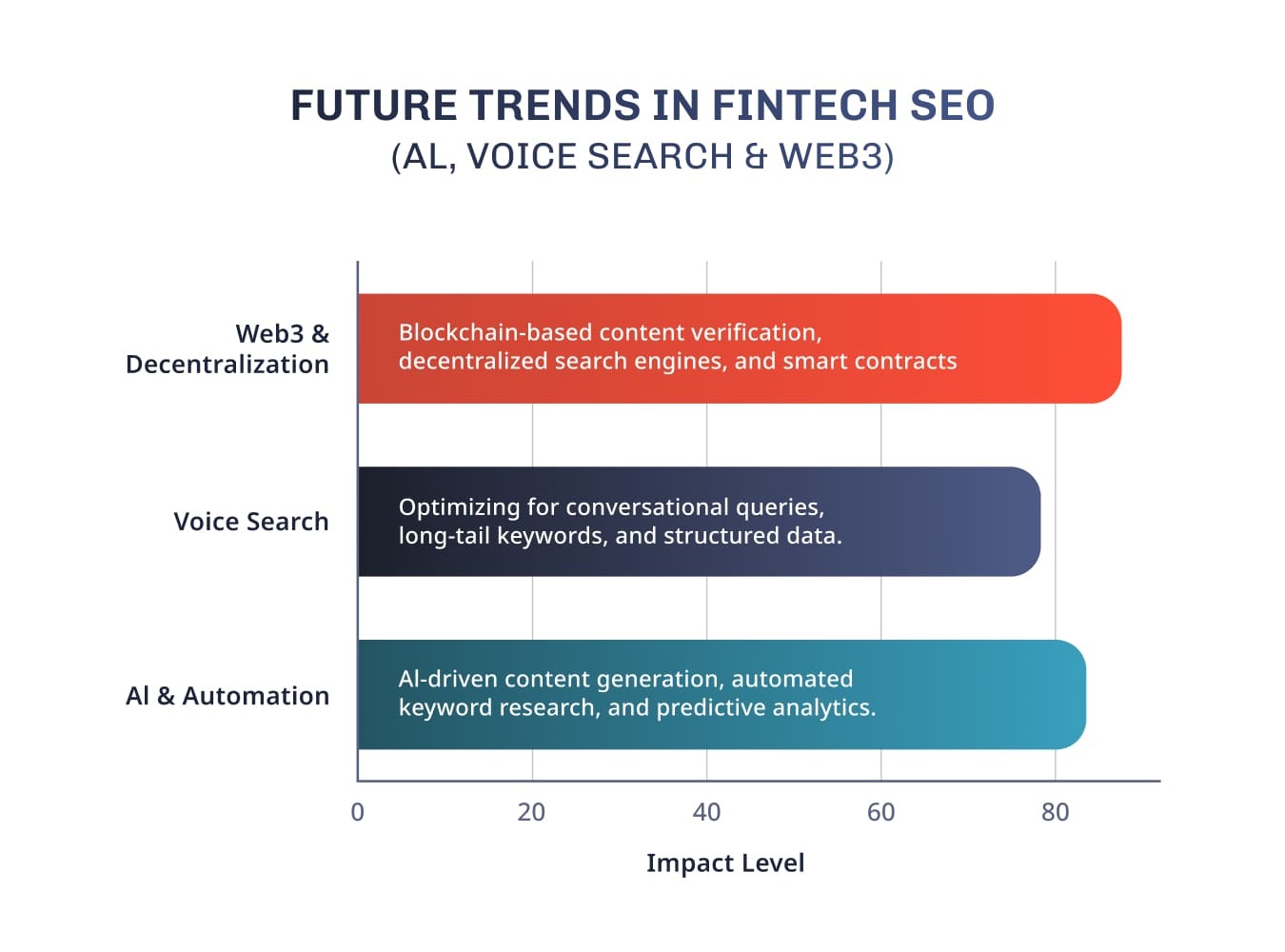
AI and Machine Learning in SEO for Fintech
Artificial intelligence and machine learning are revolutionizing fintech SEO strategies. Google’s AI-driven algorithms, such as RankBrain and BERT, prioritize content relevance, context, and user intent. A fintech SEO agency integrates AI-powered tools to refine keyword research, content optimization, and ranking predictions.
AI enhances content creation by analyzing vast amounts of search data. Fintech SEO services use natural language processing (NLP) to generate high-quality, user-focused content. Automated tools identify trending topics, optimize content structure, and predict keyword performance, improving search visibility.
Machine learning also improves technical SEO fintech strategies. AI-driven crawlers analyze site structure, detect errors, and optimize page speed. By leveraging AI for real-time data analysis, fintech digital marketing agency specialists ensure fintech websites remain search-friendly and competitive.
Voice Search and Conversational AI for Financial Services
Voice search is reshaping how users interact with fintech services. With the rise of smart assistants like Alexa, Siri, and Google Assistant, optimizing for conversational queries is essential. A fintech SEO agency adapts content for natural language processing, ensuring fintech brands rank for voice-based searches.
Voice search queries differ from traditional text searches, often being longer and question-based. SEO fintech strategies include optimizing for long-tail keywords and structuring content in FAQ formats. Financial services must ensure their information is easily retrievable through voice-activated assistants.
Conversational AI also impacts fintech SEO. Chatbots and AI-driven financial advisors enhance user engagement, reducing bounce rates and increasing session durations. Fintech digital marketing agency specialists integrate AI chat solutions to improve user experience, further strengthening search rankings.
Blockchain, Web3, and Decentralized SEO Strategies
The emergence of blockchain and Web3 technologies is influencing SEO fintech strategies. Decentralized platforms prioritize user privacy, reducing reliance on traditional search engines. Fintech brands must adapt to this shift by optimizing for blockchain-based search engines and decentralized finance (DeFi) platforms.
Blockchain enhances transparency and trust in financial transactions. A fintech SEO agency helps brands establish credibility by leveraging blockchain technology in their content strategies. Secure, immutable financial data strengthens E-E-A-T (Experience, Expertise, Authoritativeness, Trustworthiness), boosting search rankings.
Web3 introduces new content distribution models. Decentralized content storage and tokenized SEO strategies impact how fintech companies reach audiences. SEO fintech services explore emerging platforms to maintain visibility in a decentralized digital ecosystem.
Predictive SEO and Personalization in Financial Services
Predictive SEO utilizes big data and AI to forecast future search trends. By analyzing user behavior, fintech digital marketing agency experts forecast keyword demand and content preferences. This proactive approach enables fintech brands to optimize content ahead of market shifts.
Personalization is becoming a key factor in SEO for fintech. Search engines prioritize tailored experiences, displaying results based on user preferences, search history, and location. A fintech SEO agency implements dynamic content strategies that cater to individual user needs.
SEO fintech strategies also integrate AI-driven personalization in fintech platforms. Custom financial recommendations, personalized dashboards, and adaptive content enhance user engagement. Fintech SEO services use behavioral analytics to refine digital experiences, improving both search rankings and customer retention.
The future of fintech SEO is centered around innovation, automation, and personalization. By embracing AI, blockchain, voice search, and predictive analytics, fintech brands can maintain a competitive edge in search rankings. Adapting to these trends ensures long-term visibility and success in the ever-changing financial industry.
Real-World Data and Case Studies in Fintech SEO
At Fortunatos, we specialize in crafting data-driven fintech SEO strategies that deliver measurable results. Our clients, ranging from digital banks to blockchain startups, have achieved significant growth through our tailored SEO fintech services. Below are real-world case studies showcasing the success of our approach.
1. Organic Traffic Growth for a Digital Banking Platform
A fast-growing neobank partnered with Fortunatos to enhance its organic visibility and attract high-intent users. The bank was struggling with low rankings for transactional keywords and high bounce rates on critical landing pages.
Before SEO Optimization:
📉 Organic traffic: 42,000 visitors/month
📉 Top 10 keyword rankings: 18
📉 Bounce rate: 65%
📉 Account sign-ups from organic search: 800/month
After 6 Months with Fortunatos SEO Strategy:
📈 Organic traffic: 73,000 visitors/month (+73.9%)
📈 Top 10 keyword rankings: 74 (+311%)
📈 Bounce rate: 38% (-41.5%)
📈 Account sign-ups from organic search: 1,400/month (+75%)
The growth translated into a 58% increase in new account sign-ups, proving the power of a well-structured fintech SEO strategy.
2. Keyword Rankings and Authority Building for a Blockchain Payment Provider
A blockchain-based payment solutions company sought to improve its domain authority and search engine rankings. Fortunatos implemented a strategic on-page and off-page SEO campaign, focusing on technical improvements, content creation, and high-authority backlinks.
Before SEO Optimization:
📉 Organic traffic: 25,000 visitors/month
📉 Keyword rankings in Top 3: 9
📉 Backlinks from authoritative fintech sites: 12
📉 Lead generation from organic search: 220/month
After 6 Months of SEO Optimization:
📈 Organic traffic: 55,000 visitors/month (+120%)
📈 Keyword rankings in Top 3: 62 (+588%)
📈 Backlinks from authoritative fintech sites: 150+ (+1150%)
📈 Lead generation from organic search: 520/month (+136%)
These improvements positioned the company as a market leader in the blockchain payments sector, driving sustainable growth and investor trust.
3. Revenue Growth through SEO for a B2B Fintech SaaS Company
A B2B fintech SaaS provider partnered with Fortunatos to increase inbound leads and reduce customer acquisition costs (CAC). Their primary challenge was a reliance on paid advertising, which was costly and unsustainable.
Before SEO Implementation:
📉 Customer acquisition cost (CAC): $480 per customer
📉 Annual Recurring Revenue (ARR) from organic search: $75,000
📉 Demo requests from organic traffic: 60/month
After 6 Months with Fortunatos SEO Strategy:
📈 Customer acquisition cost (CAC): $310 per customer (-35%)
📈 Annual Recurring Revenue (ARR) from organic search: $200,000 (+166%)
📈 Demo requests from organic traffic: 170/month (+183%)
By shifting their focus to SEO-driven lead generation, the company significantly lowered acquisition costs while increasing organic revenue.
4. Industry Benchmarks and Lead Generation for an Investment Platform
An online investment platform needed to compete with major financial institutions in search rankings. Fortunatos deployed a data-driven SEO strategy, optimizing its content funnel for investor acquisition and authority building.
Before SEO Optimization:
📉 Lead conversion rate: 2.1%
📉 Bounce rate on key landing pages: 72%
📉 Top-ranking investment-related keywords: 6
📉 Domain authority score: 28
After 6 Months of SEO Strategy Implementation:
📈 Lead conversion rate: 3.8% (+81%)
📈 Bounce rate on key landing pages: 41% (-43%)
📈 Top-ranking investment-related keywords: 18 (+200%)
📈 Domain authority score: 42 (+50%)
A client saw a 45% increase in lead conversion rates and moved 12 high-value investment-related keywords from page 4 to page 1, securing a competitive edge.
SEO That Delivers Tangible Growth
The success of our fintech clients demonstrates that strategic SEO investment drives sustainable growth, improves search visibility, and enhances lead generation. At Fortunatos, we continue to refine our fintech SEO strategies, ensuring our clients stay ahead in the competitive financial technology industry.
Ready to achieve similar results? Contact Fortunatos today to transform your fintech brand’s online presence with industry-leading SEO expertise.
Key Takeaways and Next Steps for Fintech SEO Success
A successful fintech SEO strategy combines high-quality content, technical precision, and authoritative link-building efforts. Understanding search intent, optimizing for mobile and voice search, and leveraging AI are essential steps in staying relevant in the fintech space. Companies that invest in SEO fintech services see long-term growth, increased trust, and a steady flow of high-intent traffic.
The next steps for fintech companies include conducting a comprehensive SEO audit, refining keyword strategies, and implementing structured data for enhanced visibility. Collaborating with a fintech SEO agency ensures expert guidance in executing data-driven SEO fintech strategies tailored to financial technology businesses.
As fintech continues to evolve, so will SEO best practices. Staying ahead of emerging trends such as AI-driven automation, blockchain-based search algorithms, and personalized search experiences will be critical. By consistently refining SEO fintech marketing agency strategies, financial technology brands can build sustainable online growth and industry authority.
A well-executed fintech SEO strategy not only improves rankings but also enhances user trust and engagement. By adopting a holistic approach that integrates content marketing, technical SEO, and innovation-driven tactics, fintech businesses can secure their place in an increasingly competitive digital space.
Top 10 Steps for a Successful Fintech SEO Strategy
A well-executed fintech SEO strategy requires a structured approach, combining technical optimization, content marketing, and link-building efforts. Below is a step-by-step checklist to ensure fintech brands maximize their search engine visibility, drive organic traffic, and improve conversions.
1. Conduct a Comprehensive SEO Audit
Analyze your website’s current technical health, keyword performance, and backlink profile using tools like Google Search Console, Ahrefs, and SEMrush. Identify critical issues, such as broken links, slow load speeds, and indexation problems.
2. Research High-Intent Fintech Keywords
Use long-tail, high-conversion keywords that align with fintech user intent. Focus on transactional and informational queries, such as “best fintech SEO strategies” or “secure digital banking solutions.”
3. Optimize Website Structure and Technical SEO
Ensure your website has clean navigation, mobile optimization, SSL security, structured data (schema markup), and fast loading speeds. Pay close attention to Core Web Vitals and indexation issues.
4. Implement a Content Marketing Strategy
Publish high-quality blog posts, case studies, whitepapers, and industry reports to establish authority. Create financial guides, regulatory insights, and fintech trend analyses to attract organic traffic.
5. Strengthen E-E-A-T (Experience, Expertise, Authority, Trustworthiness)
Google prioritizes trustworthy and authoritative content in fintech. Publish expert-driven articles, get mentioned on high-authority finance websites, and ensure compliance with financial regulations (GDPR, PCI DSS, CCPA).
6. Building High-Quality Backlinks for Fintech SEO
Acquiring authoritative backlinks is a critical component of fintech SEO strategies. To improve domain authority and rankings, fintech brands must focus on effective outreach campaigns and private blog networks (PBNs) rather than outdated guest posting tactics.
Outreach remains one of the most powerful methods for securing backlinks from high-authority financial websites, fintech directories, and industry-specific blogs. A fintech SEO agency uses targeted outreach to connect with influential website owners, journalists, and niche bloggers, ensuring placements on trusted, contextually relevant domains.
PBNs (Private Blog Networks) provide another strategic advantage in fintech link-building. A well-maintained, high-quality PBN can help fintech brands establish a strong, diversified backlink profile while maintaining full control over anchor texts, link velocity, and domain authority distribution. Unlike public guest posting, PBNs allow for scalability and faster ranking improvements, provided they are built correctly and remain undetectable to search engines.
In addition to outreach and PBNs, fintech companies can secure backlinks through strategic PR campaigns, HARO (Help A Reporter Out) opportunities, and collaboration with finance influencers. By distributing high-value press releases and earning mentions in fintech news aggregators, brands can attract organic backlinks from reputable sources.
Key tactics for fintech backlink acquisition include:
✔ Outreach-based link-building – securing contextual backlinks from relevant finance websites through direct partnerships.
✔ PBN deployment – creating and managing a private network of authoritative blogs that support link equity and organic rankings.
✔ Finance & fintech PR campaigns – distributing industry news and securing editorial mentions in financial publications.
✔ Citations and directory links – optimizing listings in high-authority fintech directories to strengthen local and niche-specific SEO.
✔ Influencer partnerships – leveraging relationships with fintech bloggers, YouTube creators, and Twitter/X finance influencers to gain natural, high-authority links.
By shifting focus from outdated guest posting to high-impact outreach and PBN strategies, fintech brands can build a sustainable, high-authority backlink profile that improves search engine visibility and positions them as leaders in the financial technology space.
7. Optimize for Local SEO and Google Business Profile
If your fintech company has a regional focus, optimize for local SEO by creating location-based landing pages, managing customer reviews, and maintaining an updated Google Business Profile.
8. Implement AI and Automation for SEO Scalability
Utilize AI-driven content optimization, predictive analytics, and chatbots to enhance customer engagement and boost organic rankings. Track trends using machine learning algorithms.
9. Track Performance Metrics and Run A/B Tests
Measure organic traffic, bounce rates, keyword rankings, and lead conversions using Google Analytics and Search Console. Conduct A/B testing on landing pages to improve user experience and conversions.
10. Stay Ahead with Future SEO Trends (AI, Voice Search & Web3)
Fintech SEO is evolving rapidly. Prepare for voice search queries, blockchain-based indexing, and AI-driven search algorithms. Stay updated with Google algorithm changes and fintech market trends.
By following these 10 essential steps, fintech brands can build a sustainable SEO strategy that drives consistent organic growth, improves credibility, and enhances customer acquisition.
Need expert guidance? Contact Fortunatos to implement a high-impact fintech SEO strategy today!
Conclusion
Fintech SEO is a dynamic and evolving field that requires a strategic approach to stand out in a highly competitive industry. From keyword research to technical optimization, on-page improvements, and off-page authority building, every aspect plays a crucial role in driving organic traffic and enhancing search engine visibility. A fintech SEO agency must balance compliance, user trust, and innovative strategies to ensure long-term success.
SEO for fintech is not just about ranking higher on search engines—it’s about establishing credibility, improving user experience, and staying ahead of market trends. With financial regulations, AI-driven search algorithms, and the rise of decentralized finance, fintech digital marketing agency specialists must continuously adapt their strategies to maintain a competitive edge.

 Amazon Marketing
Amazon Marketing


